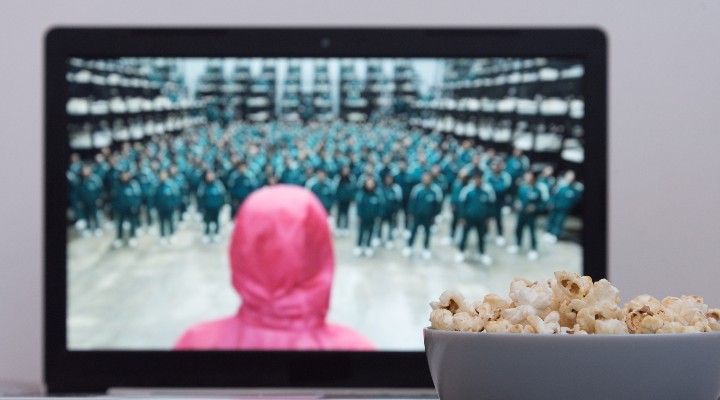New TV shows come and go. Then there’s Squid Game. The nine-part Korean drama series gained immediate international fanfare. In the first month, 142 million people streamed the show, making it the most watched Netflix series ever. What was once a niche genre, K-Drama, has become increasingly popular around the world, following the major success of South Korean comedy thriller Parasite. Squid Game, written in 2008 by Hwang Dong-hyuk, is the latest huge success. It pulls viewers into
nto a game of survival that highlights Korea’s tragic personal debt crisis.
Squid Game begins with 456 contestants. All have been chosen due to their unfortunate financial circumstances and are in dire need of changing things quickly. Soon enough, contestants realise they have been roped into a dark and dangerous game where the last remaining person is promised a grand prize of 45.6 billion won ($51.7 million).
Players participate in childhood activities; however, if they lose, they are eliminated on the spot. Squid Game is bloody and violent. Yet there are moments when viewers can relate to and empathise with characters, while admiring the clever artistic references throughout.
Some of the games featured in the K-Drama are similar to games people around the world have grown up playing. Recalling our own childhood amusements only to see participants in the show get taken out for losing at them is a juxtaposition that makes viewers squirm. It’s both shocking and captivating.
This is part of why Squid Game has forged deep connections with viewers. And strong links between characters and viewers, combined with deliberate placement of art, costume, and colour, almost always guarantees merchandising and collaboration opportunities.
As the Squid Game phenomenon spreads globally, the green tracksuits of contestants and red-hooded jumpsuits worn by the guards have become favourites for cosplay and Halloween costumes. Given how quickly the tentacles of Squid Game are taking hold of popular culture, this is an opportunity for immersive experiences in retail. Brands are taking advantage.
Popping up all over
Squid Game pop-ups are popular. They allow brands and retailers to harness popular culture trends quickly and temporarily, while they’re hot.
Strawberry cafe in Jakarta, Indonesia has found a unique way of encouraging customers back into the venue after closures during the pandemic. The shop has re-created some of the games from the show.
Rooms within the cafe have been transformed into themed areas based on Squid Game. And while there isn’t a significant pool of money to win, patrons are flocking from all over to be involved. Jumping on the Squid Game trend quickly has helped the cafe triple its earnings and gain a lot of consumer-generated content, too.
Netflix France recently opened a Squid Game pop-up shop in Paris for one weekend only. People could visit and play games such as ddakji, using the now famous red and blue envelopes thrown at the ground to take out opponents’ tiles.
Last year, Netflix created a Stranger Things Covid-safe pop-up experience in the Los Angeles area. Fans were able to stay in their cars and drive through it, visiting well-known locations such as Starcourt Mall, Russian labs, and the Upside Down featured prominently in the show.
Pop-up experiences give retailers the opportunity to create something fresh and exciting, to draw on a new audience. It’s a great strategy to show they’re aware of popular culture and excited to participate.
Cultural relevance in retail
There is huge value for retailers in leveraging pop-culture trends. One of the main reasons is that it shows an understanding of cultural relevance. This builds even greater loyalty with consumers by being on the pulse of what’s happening around the world.
Iconic ’90s TV show Friends recently aired a special reunion episode presented by James Corden, sparking global excitement. Soon after, a ticketed Friends Experience opened in New York, where people walk through a replica set of the apartments and famous cafe, Central Perk. Four months later and people are still lining up down the block to get a glimpse and take photos. Friends merchandise is high on the priority list for purchases.
Sex and the City fans will soon be able to book Carrie Bradshaw’s apartment on Airbnb, for something a leap beyond even a unique pop-up experience. In the anticipated lead-up to the show’s reboot, HBO, Airbnb and Sarah Jessica Parker have teamed up to offer a truly extraordinary experience. Parker will greet visitors, who will receive a full show experience, including cosmopolitans, a fashion styling session, and a photoshoot.
Taking well-known aspects of a TV show we’ve become attached to and re-creating them in a physical space makes the experience feel real, tangible, and memorable. And because a show such as Squid Game has become wildly popular in many countries, pop-up experiences linked to it offer a sense of community – something we’ve been craving throughout the pandemic.
When retail, the audience, and popular culture meet, there is an instant spark of excitement and interest. Draw a crowd and send them home with long-lasting memories and hundreds of dollars worth of merchandise, too.







